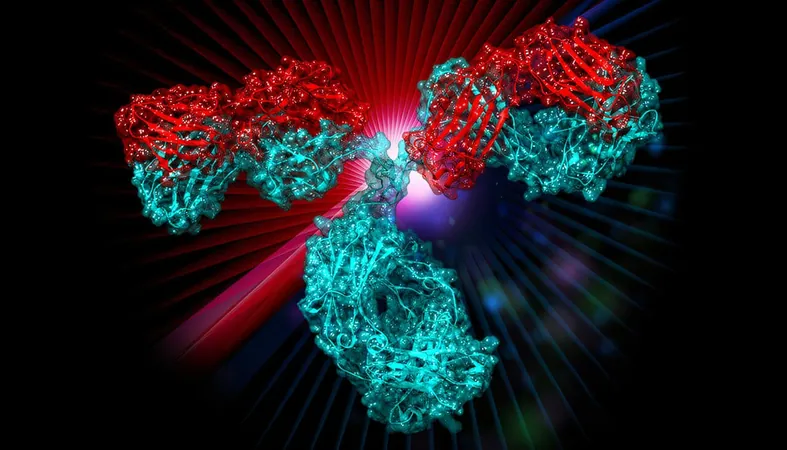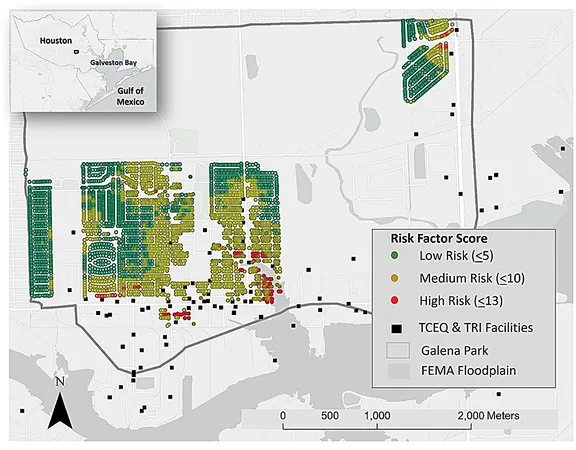
Groundbreaking AI-Powered Antibodies Poised to Combat Evolving SARS-CoV-2 Variants!
2025-04-07
Author: Wei
In a remarkable breakthrough that could redefine pandemic preparedness, researchers at Lawrence Livermore National Laboratory (LLNL) have harnessed the power of artificial intelligence to optimize an antibody aimed at neutralizing a wide array of SARS-CoV-2 variants. This groundbreaking achievement, detailed in the journal Science Advances, potentially revolutionizes how we counteract rapidly evolving viral threats.
The novel antibody, named 3152-1142, is a next-generation counterpart derived from AZD3152—a drug by AstraZeneca currently approved in Europe and Japan for COVID-19 pre-exposure prophylaxis. By leveraging advanced computational modeling and deep mutational scanning, researchers have engineered this antibody to retain its potency against multiple escape variants, including one that arose during the study itself.
“This study underscores the effectiveness of computational biology and AI in addressing public health challenges,” stated Dan Faissol, the lead researcher at LLNL. “By combining machine learning with practical laboratory testing, we swiftly designed an antibody that addresses emerging threats, highlighting our ability to combat a continuously mutating virus.”
Facing the Challenge of Viral Evolution
The urgency of this research stems from the COVID-19 pandemic's lessons; the SARS-CoV-2 virus evolves rapidly, rendering many previously effective antibody therapies ineffective against newer strains, particularly the omicron variants. Even the AZD3152 antibody, which was initially promising for immunocompromised patients, showed vulnerabilities to viral mutations that allowed the virus to escape its neutralizing effects.
In response, researchers from LLNL, in collaboration with AstraZeneca, took proactive measures to fortify the antibody's effectiveness against future variants. They employed deep mutational scanning techniques to simulate thousands of potential viral mutations, identifying critical weak points in AZD3152's ability to bind to the virus.
To address these vulnerabilities, the development team utilized the Generative Unconstrained Intelligent Drug Engineering (GUIDE) computational platform, created under the Department of Defense's Chemical and Biological Defense Program. This AI-driven program enables expedited identification of effective medical countermeasures against unexpected biothreats.
The team meticulously analyzed over 10 billion potential antibody modifications and predicted which alterations would enhance their binding capabilities against not only current variants but also those that have yet to emerge. Following two iterative design cycles, 3152-1142 was selected as the top candidate, showing an impressive 100-fold increase in neutralization potency against a variant that previously evaded the original AZD3152 treatment.
A Vision for Future Pandemic Preparedness
This research could pave the way for a new paradigm in infectious disease management. The innovative approach allows for anticipating viral evolution, as opposed to merely responding to it. Researchers aspire to develop a streamlined process to swiftly redesign antibodies, facilitating rapid approval from the U.S. Food and Drug Administration, echoing how influenza vaccines are updated yearly.
“By anticipating how the virus might evolve, we are proactive in our approach, developing therapeutics that can withstand future viral mutations,” explained Fangqiang Zhu, a computational physicist involved in the project.
As the world braces for potential future pandemics, the implications of this research extend far beyond COVID-19. With AI and cutting-edge scientific methods at the forefront, the battle against infectious diseases may soon become significantly more proactive, offering hope and protection against the threats that lie ahead.



 Brasil (PT)
Brasil (PT)
 Canada (EN)
Canada (EN)
 Chile (ES)
Chile (ES)
 Česko (CS)
Česko (CS)
 대한민국 (KO)
대한민국 (KO)
 España (ES)
España (ES)
 France (FR)
France (FR)
 Hong Kong (EN)
Hong Kong (EN)
 Italia (IT)
Italia (IT)
 日本 (JA)
日本 (JA)
 Magyarország (HU)
Magyarország (HU)
 Norge (NO)
Norge (NO)
 Polska (PL)
Polska (PL)
 Schweiz (DE)
Schweiz (DE)
 Singapore (EN)
Singapore (EN)
 Sverige (SV)
Sverige (SV)
 Suomi (FI)
Suomi (FI)
 Türkiye (TR)
Türkiye (TR)
 الإمارات العربية المتحدة (AR)
الإمارات العربية المتحدة (AR)